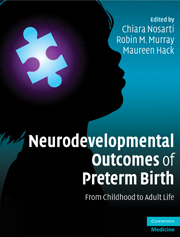Book contents
- Frontmatter
- Contents
- List of contributors
- Preface
- Section 1 Introduction
- Section 2 Neuroimaging
- Section 3 Behavioral outcome
- Section 4 Neuropsychological outcome
- Section 5 Applied research
- 16 Academic performance and learning disabilities
- 17 Pathways of risk and resiliency after prematurity: role of socioeconomic status
- 18 Cognitive and behavioral interventions
- Section 6 Conclusions
- Index
18 - Cognitive and behavioral interventions
from Section 5 - Applied research
Published online by Cambridge University Press: 06 July 2010
- Frontmatter
- Contents
- List of contributors
- Preface
- Section 1 Introduction
- Section 2 Neuroimaging
- Section 3 Behavioral outcome
- Section 4 Neuropsychological outcome
- Section 5 Applied research
- 16 Academic performance and learning disabilities
- 17 Pathways of risk and resiliency after prematurity: role of socioeconomic status
- 18 Cognitive and behavioral interventions
- Section 6 Conclusions
- Index
Summary
Introduction
With the success of neonatal intensive care in increasing the survival of very premature infants [1] came the recognition that some developmental intervention was needed for infants whose hospital stays might last several months until they were mature enough to go home [2]. Early observations revealed both the nature of the behavioral and physiological reactions of very preterm infants to their surroundings, and the characteristics of neonatal intensive care as it impinged on these immature infants. In particular, the milieu of the hospital vastly contrasted with the intrauterine environment, and the neurologically immature neonate was ill-prepared to contend with these physiological, motoric, and interactional demands [2]. As a response to these observations, investigators and caregivers began to develop modifications of their approaches to premature infants in the hospital and to consider postdischarge interventions to foster neurodevelopment. In this chapter, we will consider what is known about these cognitive and behavioral interventions and their effectiveness in the short and long term.
Theoretical perspectives
From a variety of theoretical perspectives, it would be anticipated that preterm infants might experience difficulty in achieving developmental milestones compared to their full-term peers. Neural-maturational theory posits that behavior results from an unfolding of predetermined brain function. That is, development occurs predictably as a result of integration of primitive reflexes, which allow for the initiation of higher-level cognitive function [3, 4].
- Type
- Chapter
- Information
- Neurodevelopmental Outcomes of Preterm BirthFrom Childhood to Adult Life, pp. 237 - 250Publisher: Cambridge University PressPrint publication year: 2010
- 1
- Cited by



